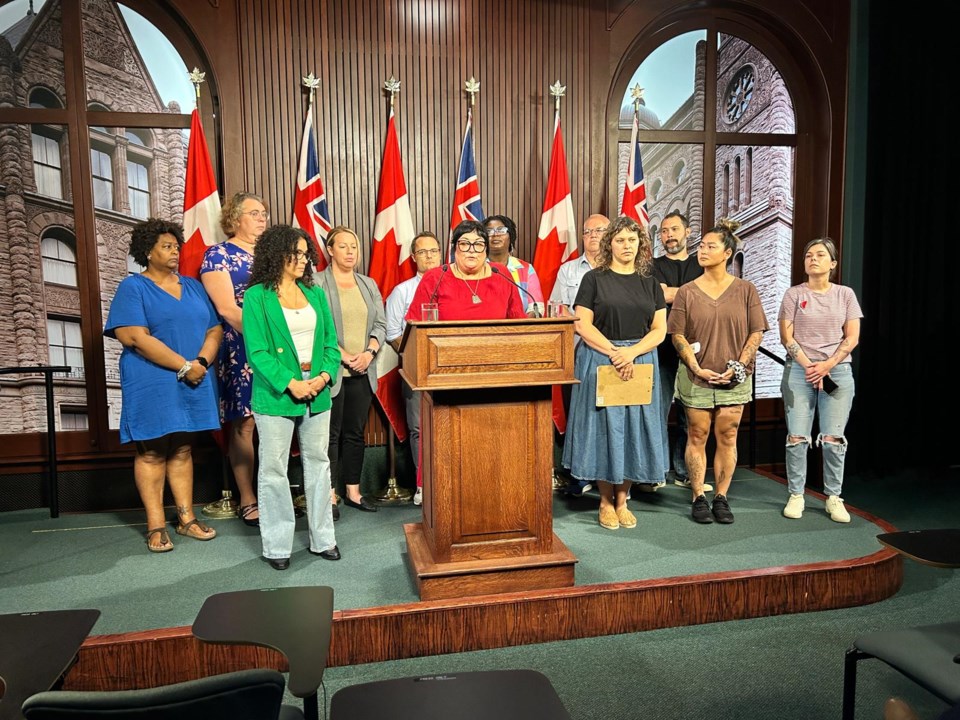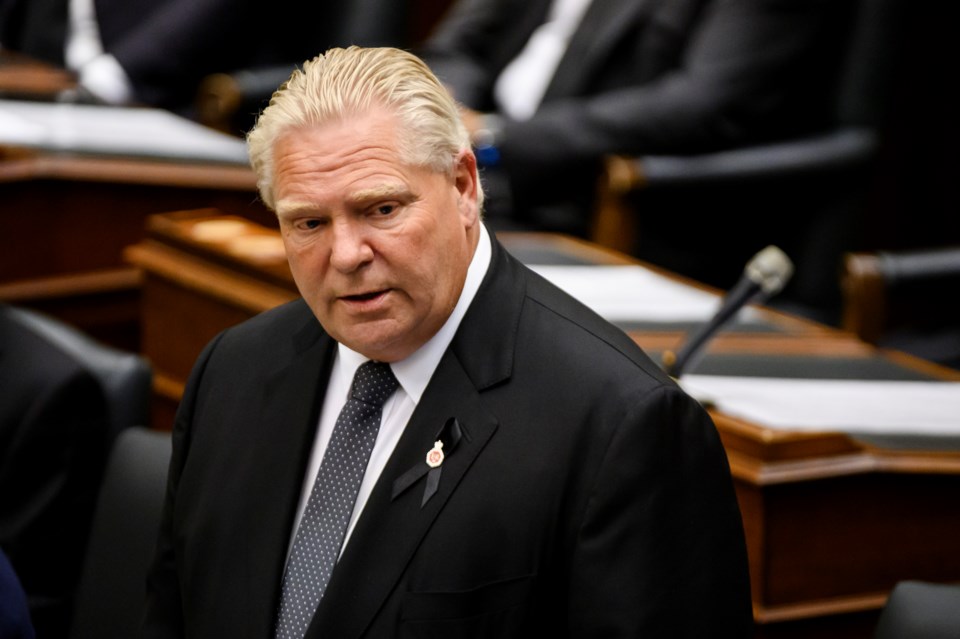Harm reduction advocates are pleading with the Ford government to reverse its planned closure of 10 consumption and treatment services (CTS) sites, while the premier said they should be thankful that they'll get more funding for treatment.
Asked on Monday about health evidence for shuttering the sites, which have reversed thousands of overdoses, Doug Ford said his take is that they don't work.
"Well, this is just my personal opinion," he said at an unrelated press conference in London. He added that his phone has been "ringing off the hook" from people concerned about issues like needles in parks.
Clients survived an average of nearly six overdoses per day at the 10 CTS sites across Ontario that are slated to close, according to federal data recorded since 2020. On an average day, about 49 people visited the sites, which made about 136 referrals to services. CTS sites often provide or refer clients to treatment, mental health counselling, primary care, employment help and other social services.
Ford said harm reduction advocates "should be very grateful" about the $378 million recently announced for "Homelessness and Addiction Recovery Treatment (HART) hubs," which the government hopes will replace the CTS sites to be closed.
HART hubs will aim to add up to 375 supportive housing units and connect people to services like mental health treatment, primary care and employment help. They won't be allowed to offer safe supply programs, supervised consumption or needle exchange programs.
Ford has been vocally opposed to harm reduction strategies for years.
"I'm not a fan of the federal government's safe supply," he added on Monday. "I compare it to giving people poker chips, dropping them off in front of the casino and saying, 'Go to town.' Or giving them a free pass to LCBO, all day, all night. That doesn't work, folks, I know, I've dealt with it within our family."
Ford's brother, the late former Toronto mayor Rob Ford, and his sister, Kathy, have both struggled with drugs.
"What works is rehab, detox beds, supporting these people with good-paying jobs — housing is absolutely critical," Ford said.
Experts say it's unhelpful to frame the issue as a choice between harm reduction and treatment — both are needed.
Two reports commissioned by the government on one controversial CTS site in Toronto recommended expanding and better funding supervised consumption sites.

Speaking at Queen's Park on Monday, a group of harm reduction workers pleaded with the government to reverse course. They warned of more deaths, more public drug use, and more of paramedics' time tied up responding to overdoses.
Lorraine Lam, an outreach worker in Toronto's downtown east end, spoke about what happens when people overdose without supervision.
"I'll never forget the first person that I found unconscious, blue and slumped over. Or the first person who died after my CPR attempts didn't work. Or the first time I called a mom and that guttural wail on the other end of the phone when I said her son died from toxic drugs," she said.
After a decade, "these firsts have become hundreds," she said.
"I signed up to be a harm reduction worker to support people, but instead, I'm now trained as a funeral director."
Asked about the premier's comments on his family's experiences with drugs, Zoë Dodd of the Toronto Overdose Prevention Society said that if his sister was using today's toxic opioids without access to a safe supply, she'd likely have overdosed or died.
"Which is a really shocking and horrible thing to say, but it's the reality of what we're living in," she said.
Jessica Lyons, a nurse at Toronto's Moss Park site, which is slated for closure, said the sites do more than reverse overdoses and point people toward treatment and medical care. They provide a community, she said.
"We run trauma-informed arts and writing programs. We feed people. We provide appointment reminders and accompaniments. We help people set up bank accounts. We celebrate every birthday. We help people tell their stories. We help families reconnect with their loved ones," she said.
"We are already doing the work that these supposed HART hubs are proposing, and we need more support and more funding to do our incredible work."
The NDP and Greens have decried the closures as an attack on vulnerable people. Liberal Leader Bonnie Crombie has agreed that the sites shouldn't be near schools, but warned of taking away services.
Green Leader Mike Schreiner said Ford essentially admitted on Monday that his plan is "not rooted in evidence and certainly not rooted in expert advice."
"These cuts will claim lives. They will lead to more disease spread, more public substance use, and more drug poisonings showing up in our ERs," he said.
Noting that Ford has walked back decisions before, Lyons said she's working with other unions to "build a very broad, unified resistance."
"I think what you'll see in the weeks to come is a mass mobilization of folks who feel strongly that these sites need to continue and that shutting them down is a matter of life and death," said Nas Yadollahi, the president of CUPE Local 79, which represents City of Toronto workers.
Ontario Federation of Labour President Laura Walton said she expects it to be a key issue at the OFL's series of town halls across the province in September and October.
Frustrated by three media questions at his presser being about safe consumption sites, Ford said they're not the biggest issue right now.
"Don't get me wrong, it's very, very important. Do you know what pays for that? Number 1 on any poll you see, it's the economy," he said, listing off Ontario's accomplishments on attracting EV business and manufacturing.
"That's what people are worried about," he said.




